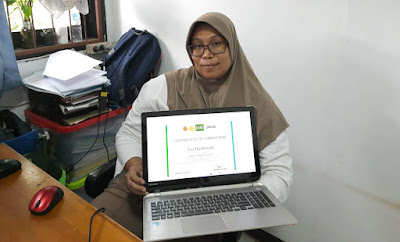 |
| ICRR researchers participate from ICRR’s meeting room. ICRR also hosted the videoconferencing held via Zoom. Photo: Suhartini, ICRR |
West Java, Indonesia–Researchers from various agencies under the Indonesian Agency for Agricultural Research and Development (IAARD) participated in a face-to-face and virtual training in the development, operation, and maintenance of the Weather-rice-nutrient integrated decision support system (WeRise) from 16 to 20 November 2020. These agencies have been identified for the uptake and dissemination of WeRise in Indonesia (Bugayong, et al.).
WeRise is a seasonal climate prediction-based app developed by the IRRI-Japan Collaborative Research Project (IJCRP). It is designed to help rainfed rice farmers plan for upcoming cropping seasons by providing advisories on the best time to plant and apply fertilizer as well as the suitable varieties to plant based on weather conditions, crop growth, selected farm characteristics, and management practices. The advisories are web-based and can be accessed through a computer or smart phone three months before the cropping season.
The ten researchers were from the Indonesian Center for Rice Research (ICRR), Indonesian Agroclimate and Hydrology Research Institute, and the Assessment Institute for Agricultural Technology (AIAT) in Central Java, East Java, North Sumatra, West Nusa Tenggara, and South Sulawesi.
 |
| Ms. Lia Hadiawati, AIAT WNT Researcher and project collaborator in WNT, receives her training certificate virtually. |
“The pandemic indeed affects us greatly,” said Priatna Sasmita, director of the Indonesian Center for Food Crops Research and Development and acting director of ICRR. “However, we should cope and not let it restrict our important plans.”
Dr. Sasmita also expressed his optimism that the participation of researchers from various institutions will help ensure the project’s sustainability. ICRR will lead the proposal to continue activities for upscaling WeRise in Central Java, Indonesia and could be replicated in other provinces to cover more rainfed rice areas in the future.
“We hope each participant will be a key person when WeRise is handed over to Indonesia,” said Ms. Nurwulan Agustiani, a researcher at ICRR and a national collaborator for the IJCRP on Climate Change Adaptation through Development of a Decision-Support tool to guide Rainfed Rice production.
“In the future, WeRise can be a supporting system to strengthen Katam,” she added. Katam is an Integrated Cropping Calendar Information System developed by IAARD to support adaptation to the uncertainties of climate change that negatively affects Indonesia’s agriculture.
Dr. Hasil Sembiring, IRRI representative to Indonesia and liaison scientist, encouraged the use and dissemination of WeRise. Dr. Sembiring also invited the participants to suggest possible improvements to WeRise as these are necessary for the technology’s rapid evolution to be more effective.
Dr. Keiichi Hayashi, project leader of Japan International Research Center for Agricultural Sciences, informed the participants of the opportunities for upscaling WeRise in African rainfed rice areas. “However, I have always been proud to mention that Indonesia is the pilot area for WeRise development,” he noted.
The training was organized by IRRI and ICRR under the leadership of Ms. Suhartini, head of ICRR Collaboration Division. It was funded by Japan’s Ministry of Agriculture, Forestry, and Fisheries and facilitated by Ms. Lizzida Llorca, IRRI researcher and WeRise system developer. The face-to-face sessions were held at ICRR in Sukamandi, West Java.
###

No comments:
Post a Comment